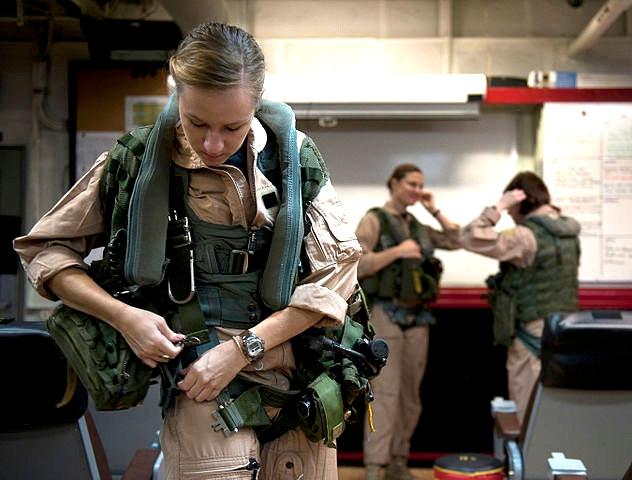U.S. Department of Defense end ban on women in combat roles
Pilot Lt. Ashley Ruic prepares before flying with the first all-female-crewed combat mission. (Photo by James R. Evans via Wikimedia Commons.)
Defense Secretary Leon Panetta, in a landmark decision on Wednesday, overturned a 1994 Pentagon rule banning women from serving in direct combat roles.
The ruling follows a federal lawsuit filed by four servicewomen who challenged the government’s restriction on combat.
Though women have already held combat roles on a more ad hoc basis, they weren’t recognized for that..
Rosa Brooks, a law professor at Georgetown University and former Pentagon official, says the lawsuit wasn’t necessarily the deciding factor for Panetta because the ban had long been an issue.
“This is just an overdue recognition of the reality, which is that women for many years have already been out there in effect in combat, (but) not enjoying some of the career opportunities and opportunities to serve that they’d like to have,” she said.
Lifting the ban will be a game changer, Brooks says, because it has the potential to transform the military.
The change will open up leadership positions to women that they were previously locked out of because the positions required specific military occupational specialties and training women couldn’t go through.
“We may see a military 30 or 40 years from now that has a vastly greater percentage of women in the most senior positions,” she said.
Kristen Rouse, a lieutenant in the Army National Guard who just returned from a 31-month tour in Afghanistan, says success in combat is as much about problem solving, critical thinking and building relationships as it is closing with the enemy.
“We have seen women in combat roles right alongside infantry men, which is a closed position to (women),” she said. “But because of the different needs that have occurred on the battlefield, I personally have seen military police, intelligence specialists, female engagement teams, medics, civil affairs specialists and others that have been right there alongside the infantry.”
But those women weren’t recognized for being assigned to combat units, even if the men they served alongside were.
That specific recognition factors into women’s ability to advance through the ranks.
“As a female, you’re assigned to a unit to which females can be assigned, whether a support battalion or a headquarters element and you’ll be attached out to that infantry unit. But your personnel record will not show that combat assignment,” she said.
Women already could receive a combat badge for their performance in the direct line of fire, Rouse says, but evaluations wouldn’t recognize that work.
Wanting the recognition is less about the responsibility of taking down the enemy, and more about accomplishing the mission, she added. We’re all on one team, Rouse said, and women want to be counted as full team members just like their male counterparts.
Rouse, who’s been in logistics throughout her military career, says she wants to support the team responsible for leading a takedown mission.
“I want my team to win and I want to do anything I can to ensure that they win,” she said. “If that involves being out there in forward positions where enemy fire may be a possibility, absolutely I will be there.”
The military knows how to give their personnel the skills they’re going to need for all of these positions, Brooks said. Now, it’s just a matter of opening up those opportunities for women.
“These combat occupational specialties are not going to appeal to all women anymore than they appeal to all men. But I think it’s long overdue to give women the opportunity to compete for them and train for them,” she said.
